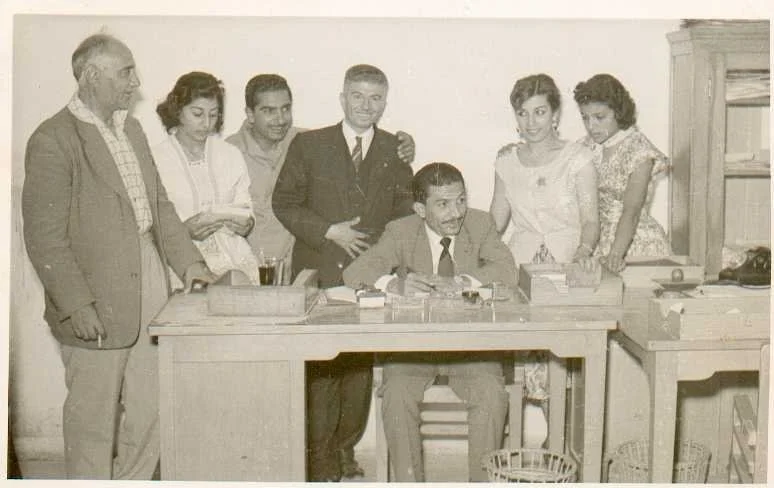Tawfiq Al-Nimri: an Icon of Jordanian Music & Bedouin Culture
Words by Reenal Igboanugo
This is a love letter to Jordan, just as much as one to Tawfiq Al-Nimri and the beautiful work he did in conserving Jordanian history.
To interject a personal anecdote, Jordan, as a country, is sort of a nebulous creature. When compared to other countries in the region, for some odd reason, Jordan is dismissed as being boring, quiet, and even small (figuratively and literally). However, as a staunch Jordanian through and through, raised on the quiet hilly neighborhoods of Jubeiha, spending nights out in the bustling streets of Jabal Amman, and heading to the quieter sides of Jordan, immersing myself in our rich Bedouin culture, I can safely say my bias is heavy. My love for Jordan is endless.
I feel that we Jordanians focus too much on trying to prove that Jordan fits within the traditional definitions of “fun and happening,” that we neglect our rich historic roots, our Bedouin past and future, and our folkloric culture, which deserves its own praise. Let us then leave the capital city of Amman and head north to Irbid, where one of the greatest folkloric musicians, Tawfiq al-Nimri, was born.
Tawfiq al-Nimri (توفيق نمري) was a Jordanian singer and composer significant to the composing and cataloguing of Jordanian musical history. He was born in the town of Al Husn, in the North of Irbid, on June 10th, 1918. Al-Husn houses Jordan’s oldest Orthodox church and has a large Christian population. Al-Husn was part of the Greco-Roman Decapolis cities created under Pompey. These Greek ties still hold strong in modern Jordanian culture, as at school, Al-Nimri learned Greek and how to sing Greek hymns in the Byzantine style.
Al-Nimri's grandfather, Rizkallah Al-Nimri (رزق الله النمري), took great lengths to make sure that his grandchild was well educated. He raised him after the death of his father when he was quite young. Rizkallah was a man imbued with a passion for music, spirituality, and a deep love for Jordan. He played a Rababa at home (the Jordanian version is usually single-stringed), and was also infatuated with Nabati poetry, which is commonly known as Najdi. This type of poetry differs greatly from traditional Arabic poetry because of its use of colloquial Arabic, abandoning traditional Arabic poetic form and structure. Nabati poetry is key to giving oral historical insight into Bedouin culture and life making it essential to Arabic society. Thus, one can see how Rizkallah’s interests thoroughly influenced Tawfiq.
At a young age in school, Tawfiq was recognized for his talents and was encouraged to sing by his peers and teachers. As he grew older however, he served in the Jordanian army for seven years during which he saw great change within Jordan. He was part of the Arab Legion, which served the Transjordanian emirate (part of the British protectorate) at the time. As part of the British protectorate, Transjordan had to fight along with the British against the Syrian Democratic Forces. During World War II, Al-Nimri had to work alongside the English in building the Haifa Road via Baghdad. Fighting alongside one’s enemies in protecting “their lands” leaves one with the feeling of melancholy. But his time in the army was not spent sullenly. Al-Nimri would play music on the oud and sing for the army men for fun. After serving his seven years, he moved to Ramallah, Palestine, in 1949, and there he began with his large collection of folkloric music.
In Ramallah, Al-Nimri worked in a radio station creating dozens of songs. He dedicated and presented one of his songs to the first King of Jordan, Abdallah I, during his visit to Ramallah. He knew of the king's love of Hijazi songs, thus created يابو قرون جدلاتي yabo karoon jadalati. After being in Ramallah for 10 years and the violent occupation of Israeli settlers in Palestine in 1948, Al-Nimri had to flee back to Jordan. In the Jordanian Archives, he left behind a collection of 750 songs, of songs he wrote for Quds, reminding Arabs to continue the fight for Palestine. In these songs, he collaborated with a multitude of major singers, such as Nasri Shamseddine, Samira Tewfik, and Wadih El Safi. Al-Nimri holds four royal medals for his adherence to the preservation of Jordanian folkloric music, being the first Jordanian to ever collect such a large number of songs and compose them. These songs were the first ever composed, recorded, and submitted to the Jordanian musical canon. His songs are patriotic, romantic, and sha’abi, and he is still loved dearly by Jordanians even after his death on October 23, 2011.
Sources
Yara Marei. “Al-Husn: The Lost City of the Sun - Arab America.” Arab America, 19 Mar. 2025, www.arabamerica.com/al-husn-the-lost-city-of-the-sun/. Accessed 29 Aug. 2025.
“توفيق النمري.” Wawalbalad.org, 2020, wawalbalad.org/ar/ArtistsHandbook/66. Accessed 5 Nov. 2024. “توفيق النمري – عرب مسيحيون مؤثرون.” Christianarabfigures.com, 2019,
christianarabfigures.com/362-2/. Accessed 5 Nov. 2024. النمري, نبيل. “جريدة الدستور || مقتطفات من حياة توفيق النمري وسيرته.” Archive.ph, 19 Apr. 2013,
archive.ph/20130419131641/www.addustour.com/ViewarchiveTopic.aspx?ac=%5Csupplement2%5C2010%5C05%5Csupplement2_issue946_day14_id236369.htm. Accessed 5 Nov. 2024.
“His Highness Sheikh Mohammed Bin Rashid al Maktoum - Nabati Poetry.” Sheikhmohammed.ae, sheikhmohammed.ae/en-us/nabatipoetry.
“توفيق النمري.” Jordaniansongs.net, 2025, www.jordaniansongs.net/tawfiq-al-nimri. Accessed 29 Aug. 2025.
Jordan Word News. “ماذا قال الملك عبدالله الأول عن الفنان توفيق النمري ؟.” YouTube, 21 May 2022, www.youtube.com/watch?v=GBH6PHi1Alg. Accessed 29 Aug. 2025.







